
TiTle
SupporT
ConTaCT
diSClaimer
Folio A Literary Magazine
Salt Lake Community College
Volume 9 Number 1 Fall 2007
CopyrighT
Each author retains copyright individually. Cover
Original work by Lawrence Tyson Magana, Entitled Schitzo.
Awakening. Inspired by Folio’s Literary Editor Adam Haver.
Provided by the Department of English and Globe Student Media at Salt Lake Community College.
4600 South Redwood Road, Salt Lake City, Utah 84123. In Writing Center, Room AD 218 at the Redwood Campus, (801) 957-4893, folio@slcc.edu. www.slcc.edu/folio.
The Globe Student Media are open campus forums, and we encourage written expression of diverse points of view. Salt Lake Community College is not responsible for the opinions expressed in Folio, nor do the pieces represent an official position at Salt Lake Community College. Individual authors are solely responsible for the opinions expressed herein.
contents Editors’ Column Author and Artist Bios Editors’ Thank You Join Staff Entries for Spring 2008 Folio Online Literature My Sisters Transform into Small Birds // Lynn Kilpatrick Three Nights in Vegas // Ryan Hollist Coal Under Pressure // Sophia Ty The Match // Michael Siguenza My Grandma’s Insides // Jonathan Bentley Te Busque // Javier Campos Death of an Icon // Neal Whitlock Night @ The Bar // Kayla (K.C.) Cunningham Memorial Day // Linda Howell Bullets and Balls // Clint Johnson 3 8 10 12 15 20 25 26 34 36 39 6 86 91 92 93 94 TABLE OF Literary Editor Adam Haver Design Editor Jenna Neilson Staff Editors Noelle Gannon Scott James Neal Whitlock Julie Hirschi Folio Advisor Lynn Kilpatrick Writing Center Liason Clint Gardner Globe Student Media Director Nick Burns
Unbroken// Katie Christensen Stabbed in a Midnight Knife-Fight // Ian Humphreys The Dream // Brandyn Cross Hippo Girl // Nathan Henry Peterson A New // Sarah justice Professor Stirs Controversy by “Emulating Frost” and Flinging Students // C.J. Cristopherson My Happy Thought // Traci Grant My Rock // Cyndi Brown El Amante Fantasma (The Phantom Lover) // Kayla (K.C.) Cunningham The Zebra War // S.A. James Sea Shore Blues // Andrew Call Literature (continued) 4 45 48 51 52 58 60 66 70 76 80 85
Artwork
Old Bird // Joe Beckstead
The Eidelon // Lawrence tyson Magana
Hope // Michael nikola Consider // Ji-Young Park
First
Little
Trapeze Clown // Bradon Anderson
A Tree’s Perspective // David Crane
Singular // Rachel Long
Happy World Land // Lawrence Tyson Magana
Boy Against Brick Wall
F-Train // Andrew Call Tribute // Bradon Anderson Color Marked Drone // Jonathan D. Lisonbee Confusion // Beau Walker Sunrise Eagle // Linh Troung Warsong // Justin Watson
// Julie Hirschi
Snow // Spencer Anderson
Ferarri // Marck Pereira
Shout Out // Ji-Young Park
Girl in Field // Julie Hirschi
Women
Daily Dose // Joe Beckstead Teddy // Jonathan D. Lisonbee Water Tower in City // Julie Hirschi 5 9 11 13 14 22 24 27 33 34 36 38 44 46 49 50 55 57 59 62 67 68 71 73 77 84
Klamath
// Virag White Sunflower // David Crane Since 1976 // Michael Nikola
EDITORS’
The stir of day Life beneath a blanket heap An ancient ritual and Mundanesomehowspiritual
For who has not awaited, With eyes wide shut Blind but still gazing, An
ending to night’s cold
The closing scenes of dark sleepsHopenever
.
Written by Adam Haver Literary Editor
6
Awakening
column
Stone Goddess
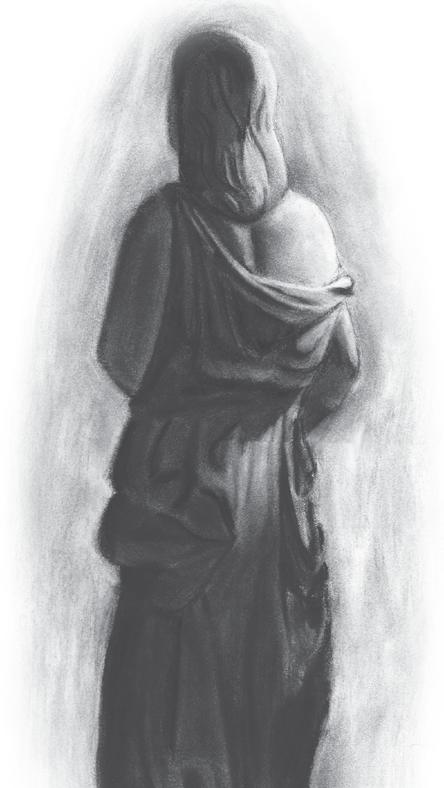
Jenna Neilson Design Editor
Charcoal
My Sisters Transform into Small Birds
That’s my sister out on the lawn. See? She’s fluffing her feathers and trying to be a robin. No, she is a robin, spreading her wings and then pretending to be dead. Where are the others? There, arranged among the leaves, one to a branch. See how each behaves as if she were the only bird? But how can all be best? My mother says her love is equal, spread evenly among us. But one bird squawks, one sings softly, the third’s a hawk, eyeing others for signs of weakness. And, me? Well, I’m here in the kitchen. How can I be a bird to match their beauty, song or eye? I know. I’m the blackbird, concealed in a pie.
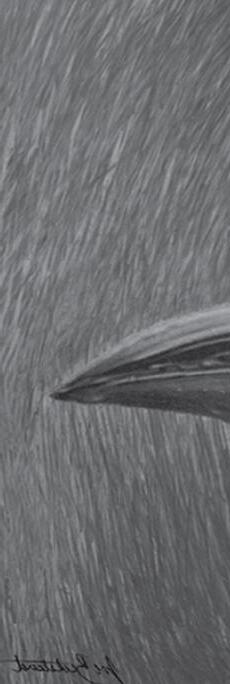 Written by Lynn Kilpatrick Folio Advisor
Written by Lynn Kilpatrick Folio Advisor
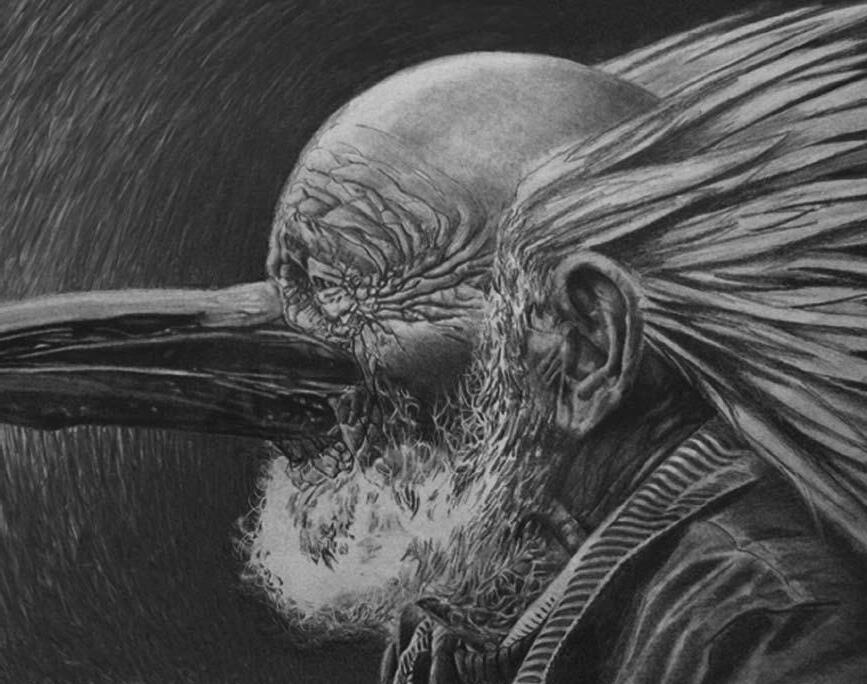
Bird
Beckstead // Graphite
Old
Joe
Three Nights in Vegas
Written by Ryan Hollist
The steel-glass ziggurats row upon row shrines to some green-parchment god
The sirocco heat and hypnotic lights only leave me sick and annoyed
Were Babel’s foundations as wide?
A black-winged bird walked on the watered-green grass
A sleek, simple silhouette its clear, chiming call
The only moment I felt God.
10
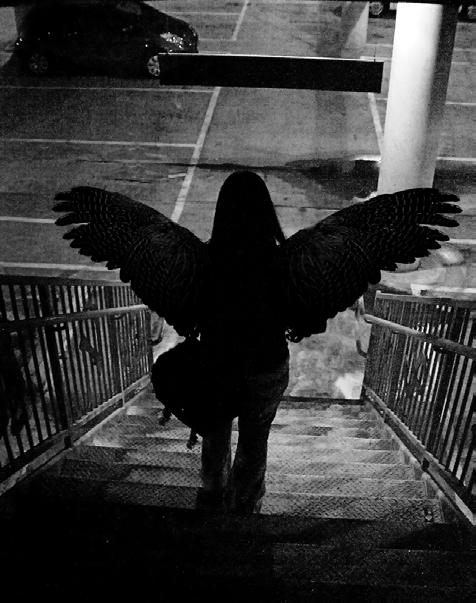 Lawrence Tyson Magana
Lawrence Tyson Magana
11
The Eidelon
Coal Under Pressure
Written by Sophia Ty
Coal under pressure
I would like you to know that my great grandfather was a coal miner and that he represents all of us. I would like you to know that the oppressed and the abused and the people with no voice to represent themselves may just be and that they have the most to say. Take a glance at their silent eyes for they’ll speak volumes to you. Take a look at their struggle for it’s what makes them beautiful.
They are the enduring. They are the skilled. They are the ones that overcome each and every day.
They’re called the sleeping giants.
As he lifts his heavy stones he is informed of who and what he is. As he cries at night from his wounds he remembers who and what he is and later as he rails against his captors he will declare who and what he is. Struggle is a burden that is cast upon the weak without realization that you are simply honing their strength. My great grandfather was a coal miner. It was forced upon him to overcome. It might be forced upon you to overcome. So let them throw their rocks and let them push a boulder into your path. Because you and I will pick and mine and come forth with diamonds. Because we are simply
Coal under pressure
12
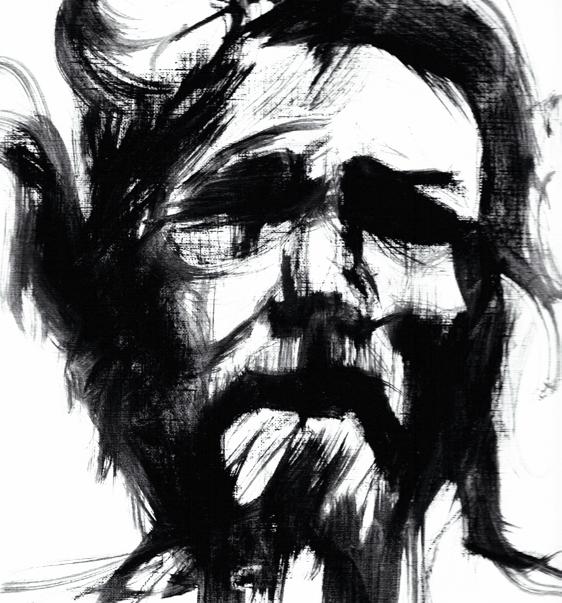 Hope Michael Nikola
Hope Michael Nikola
Ji-Young Park Consider

The Match
written by michael siguenza
Most of my earliest memories
are of living in Seattle, and have their foundations in the damp green smell of fern blended with low tide on the sound, images of bright yellow leaves glowing slick and flat on wet cobblestone, the gloom of early dark at 4pm.
My father was back from Vietnam for good this time and had moved us off of Capitol Hill to another neighborhood in Seattle called Wallingford. He was driving cranes down at one of the shipyards during the week and on Sundays we would return to the old neighborhood.
My little brother and I spent all day hanging outside the front of a
vacuum cleaner shop owned by my father’s friend on 14th and Pike, on the hill above downtown. There were a lot of pictures of racecars, horses and boxers on the wall, lots of foot traffic and an amazing number of telephones. I was seven years old and thought it must be the busiest or only vacuum cleaner shop in the city. I was later to learn that it was a bookmaking front and pornography warehouse. Sometimes we visited boxing clubs and auto repair shops on the old brick streets slippery with rain.
My father coached boxing to kids the next block down at the Boys Club in Wallingford and one night I was summoned out to the front porch where one of the
15
Under the flourescent lights, cigarette smoke obscured the view...
‘‘ ‘‘
older kids told me that my dad wanted me down at the club and I was to come with him immediately. I was perplexed, but in no position to argue. This is what I remember: The club was full of people, parents and children. Under the fluorescent lights, cigarette smoke obscured the view and loud voices filled the room to distraction.
There was my father, talking loudly to another man, both standing near a reasonably professional boxing ring, complete with skirts and ropes elevated two feet above the floor in the center of the parquet basketball court. He looked up, saw the kid I was with and motioned us impatiently towards the dressing room in the corner of the court. He couldn’t have even seen me, I was too short. The kid took me to the dressing room where a number of men were waiting by a table. The room was cinder block, damp and chill, and lit by one electric bulb hanging bare from the ceiling. They all descended on me, smiling and patting me on the back. I don’t remember what any of
16
them were saying until they had me stripped to my underwear, laced up a pair of boxing shoes on my feet and taped my hands. Then one of the men, a black man who was my father’s buddy, told me to put on the shorts.
This is when things became vivid: the shorts. They were gold with a red stripe and had the famous Everlast tag sewn to the front along the waistband. They were gigantic.
As the men were tying on my gloves, a thought was crystallizing in my mind. I was going to have to go in front of all those people out there and get up in that ring in front of them wearing those shorts. I was vain even back then. As far back as I could remember, girls had made a fuss over me and adults had always commented, smiling at what good looking children my parents had.
My Auntie’s friends would cry out in delight when we were with them and tug at me asking for a smooch. I was used to it. I loved it.
I wasn’t going out there in front of all those people wearing those shorts. No way.
‘‘ I was going to have to go in front of all those people out there...
‘‘
17
...there it was. There was no way out.
‘‘ ‘‘
Then I knew that if I didn’t, my father would think I was too chicken to box some kid I hadn’t even seen yet. I didn’t care about the kid. I just didn’t want all those people seeing me wearing those huge shorts. I knew that I looked ridiculous, like a little brown stick figure wearing a huge golden tent tied around his waist, but there it was. There was no way out.
I got mad. I was really pissed off. I wanted to kill my father. The men were chuckling and I remember someone mumbling “…lookit that game face…. just like his old man…..”
The next few minutes went by quickly. What I remember is stepping into the rosin box to get traction on my shoes, I remember an evil little smile on the face of a sweating redheaded boy half my size and then that same kid being helped up off the canvas as he was beginning to cry.
18
My father’s friends were jumping up and down, cheering and slamming him on the back and I fairly leapt between the ropes to get back to the changing room and out of those shorts.
On the way home, the boy that had brought me to the club said, “Damn, your father’s proud of you!”
It was the one and only time I ever heard anyone say that, certainly not my father, and it was all because I was embarrassed to be wearing those great big shorts.
‘‘ ‘‘ Damn, your father’s proud of you!
19

My Grandma’s Insides
Written by Jonathan Bentley
These visits never vary much. I pray through the trip in my old Saab that the new sounds it makes aren’t serious and if I arrive at grandma’s she smiles apologizes about something she hasn’t tidied and brings me up to speed on her medical news. Today she got a hold of a real person and it turns out they have to operate again, probably benign but they want to be safe.
Her doctor’s name is Wong. She makes a horrible pun and says “All these Japanese doctors got me feeling like chicken chow mein! Ha ha...”
I laugh along with her. Is that okay?
I hope she won’t say these things to her doctor but I wonder if he’d mind, might depend on the day.
20
If he’d had any sleep the night before or if some patients died that day. Did he have family in Hiroshima?
Some internment camp?
The twin towers or that other building that for some reason collapsed the same day?

She shows me the pictures they took of her insides and somehow while looking at one of her body parts (reminding me of those disgusting circus peanuts sold at gas stations)
she is reminded of a story:
the one about V-day when my great-grandpa Weidauer celebrated the surrender of his parent’s country by drinking himself sick, catching an escaped cow by the tail and being dragged around his field.
Later his wife got tired of his shouts and left to buy him Alka-Seltzer.
21

He lay on the couch for hours, his daughter tried to appease him while his wife picked up a good-looking soldier and drove him the last 50 miles of his journey home.
I drink a glass of water from the jug in the fridge she keeps filled for my visits, go outside check the gas and oil and mow her lawn (diagonally up the hill because she thinks it looks classy). Halfway done when I’m stopped by robin wings, no robin attached only the wings left like they’re growing right along with the chemically-treated grass.
“Those lousy starlings I don’t care about, but I hate to see a dead robin.”
I remember Homer’s Odyssey. Remember his bird-signs and wonder if dead birds might be more than just unlucky animals,
22

a warning of our bitter fate due to unholy hubris, or maybe these wings sprouting from the earth are just a gift from that gray-eyed goddess, attempting–in her quaint epic-poem way–to lift us above our mortality. Boy Against Brick Wall
Julie Hirschi Staff Contribution
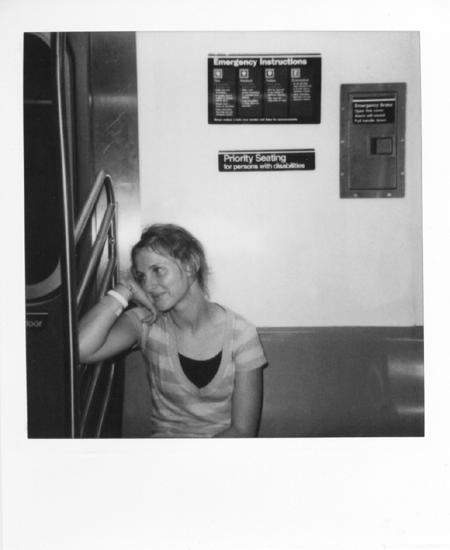
24 Polaroid by Andrew Call F Train
Te Busque
Written by Javier Campos
en mis recuerdos, esos... los que un dia dejaste.
En los suenos mojados, que en un lecho aun yacen.
en las miradas, dulces, candidas, perdidas...distantes.
En los besos furtivos, los que un dia tu amaste.
Te busque Te busque
en los rincones, de las calles oscuras.
En el alba la aurora, el ocaso y la tarde.
en mis recuerdos, esos... los unicos que dejaste.
En el sabor del amor, nectar amargo que un dia en mi sembraste...
Te Busque Te busque Te busque
Te Busque Te TeBusque Busque
25
Death of an Icon
Written by By Neal Whitlock
Most people
are familiar with superheroes. The stories about these super-beings fill the pages of comic books and children’s imaginations. As children grow older most of them spend less time reading comics, but the memory of the great characters never leave their minds. The wonders and adventures that the characters experienced will always remain a part of the inner-
die Superman was going to
child in all of us. There are times though, when what we have left behind strikes us in a way we never expected, and what we thought we had outgrown catches back up. Such was the case in late 1992 when the world was stunned by the announcement that Superman was going to die. The invincible hero of our hearts was going to meet his match, and nothing would be the same again.
26
Staff Contribution

Tribute Bradon Anderson // Photogr aph
The story began
in an ordinary conference room in early 1992. At the time, the character Superman was appearing as a headliner in four separate comic issues each month, each with separate creative teams working behind them. With so many people writing and drawing for the character, large meetings were regularly held to collaborate on possible story lines. Even though there were four different issues, what happened in one series of the comics affected the other three so the creators had to get their ideas straight (Daniels 218).
Wouldchange forever comic
werebooksviewed the way
In this particular meeting, a joke was made that Superman should be killed. A plan to have Clark Kent, Superman’s alter ego, and Lois Lane, the love interest, marry had been in the planning stage for several years. The two characters had been engaged for
two years and the wedding had been set aside to coincide with the release of a new television show in late 1993. The option of killing the character and bringing him back to life was chosen as a means to create added interest in the comic series and stall for time so that the wedding would also build hype for the television show (Daniels 218). The events that were to follow would not only build interest in Superman, but would change the way comic books were viewed forever. The following is the plot synopsis culminating in Superman’s death as written by Dane Jurgens, Jerry Ordway, Louise Simonson, and Stern Roger.
In the peaceful countryside of the American heartland, a dull thud stirs the birds from the trees. The thud sounds again, more loudly, and the deer scatter.
28
The noise repeats. Each time it increases in volume until one final sound echoes like thunder and the noise ceases. From a crack in the ground, a creature called Doomsday has loosed the restraints over one of his arms and has broken out of a cage buried beneath the earth. Once in the open, the monster begins to move over the countryside, destroying anything that it nears.
Superman is in a television studio being interviewed when the broadcast is preempted to feature news of the Justice League’s defeat. In a flash, Superman flies from Metropolis to provide aid.
Many of the leaguemembers andunconscious dying
The destruction does not go unnoticed by superheroes, and several arrive to investigate what has happened. They are known as the Justice League of America, a group of Superheroes that Superman is viewed as the leader of. It is not long before the Justice League and Doomsday begin fighting, and almost as quickly as it begins, the fight ends with many of the League members unconscious and dying. Hundreds of miles away in the city of Metropolis,
Upon Superman’s arrival, the remaining Justice League members capable of fighting begin to battle Doomsday with Superman’s help. The encounter follows the pattern of the first with even more of the League members dying and ends with the destruction of a house. Doomsday leaps into the air away from the house; his great strength makes him capable of jumping into the air and landing several miles away. Being the only League member conscious, Superman immediately gives chase, trying to prevent Doomsday from reaching a major city and doing incredible amounts of destruction.
29
While Superman
is trying to intercept Doomsday, one of the children in the now burning house is trying to rescue his family, but is unable to withstand the heat. Seeing that he cannot do so alone and that the Justice League members near him are in no shape to assist, the boy begins yelling for Superman to return and save his mother and sister.
As Superman is about to catch Doomsday, he hears the cry of help from the boy. Feeling that he cannot let Doomsday escape when he is so close to catching it, Superman continues on. Once close enough, Superman grabs Doomsday and throws the monster back to the earth. Superman attempts to stall Doomsday by burying it deep in the mud under a lake, and then returns to rescue the family. Taking this time to save the boy’s family does not come without cost. Doomsday breaks free of the temporary hold and continues on its path, directly towards Metropolis.
Superman leaves the boy’s family safe, and flies into the air to catch Doomsday once again. Having let so much time pass, Doomsday has reached the rural towns surrounding Metropolis. The fight that continues once Superman catches up is now filled with citizens trying to escape the destruction, and Superman trying to keep the fight from them. With his focus being spread to those around, Superman is unable to stop Doomsday from escaping his grip time and again. The monster presses on to the large city in the horizon.
Upon reaching Metropolis’s city limits, the battle begins causing greater destruction as the combatants hurl each other through the streets, and even through buildings. Lois Lane is near the action to see the events unfold with interest as both an intrepid reporter and the fiancée of Superman. At one point, Superman rescues Lois from a falling helicopter and once on the ground safely, exchanges a kiss and vows that Doomsday will
30
be stopped. With renewed conviction, Superman engages Doomsday.
Each fighter throws punch after punch onto the other with such force that the windows of nearby cars and buildings are shattered. Craters are left in the streets where they slam the other to the ground. By this time, Superman’s iconic uniform begins to tear. His cape has already been shredded and blood is escaping from open wounds. Knowing that no one would be able to stop Doomsday if he were to fail, Superman unleashes the full force of his powers onto the monster. Within moments, the noise from the fight ceases. All around them is destruction. Onlookers try to see what has happened, Lois Lane being at the forefront among them.
Superman herdies arms in
the rubble, Lois races to Superman. Cradling him in her arms, he asks softly of Doomsday’s condition. Lois assures him that the creature is no more and begins to tell him to rest, but it is too late. Superman dies in her arms. This epic confrontation would set the precedent for future comics regarding what a superhero was capable of.
Interest was so invigorated by this that the issue Superman died in has sold more prints than any other single issue to date. The news of Superman’s death was featured on news broadcasts and in newspapers as if the character had been human and actually died (Daniels 218).
As the dust settles and the two combatants are seen motionless in
Of particular interest though, is that while the death had been intended to be the feature of the story, the comic issues that followed the funeral and life in Metropolis with Superman became the focal point.
31
Each
issue sold well as the general population was interested in seeing what the death of Superman would bring.
From this sacrifice of a hero, a template was made for future comic superhero stories to be told. Not long after the return of Superman, a story arc began which resulted in the death and eventual return of Batman. This death, much like Superman’s, was the result of an individual attempting to do all that he could to save his home and the people he loved.
New But that is a story for another time.
Works Cited
The events of Superman’s death cemented him in the hearts of millions of returning fans and newcomers alike. It is interestingly ironic that a character already so popular and well-known had to die in order to find a new life in the modern culture and mythology of our society. Superman was eventually brought back to life by a being known as the Last Son of Krypton and was also involved the near-death of his foster father Jonathon Kent.
Daniels, Les. “The Death of Superman: A Hero is Put Out of Action.” DC Comics: A Celebration of the World’s Favorite Comic Book Heroes. (2003) Jurgens, Dane; Ordway, Jerry; Simonson, Louise; Roger, Stern. The Death of Superman. DC Comics (1993)
32
Color Marked Drone
D. Lisonbee
 Jonathan
Jonathan
Night @ The Bar
Written by Kayla (K.C.) Cunningham
Far off screams fill the deserted streets, splintered sounds skirmish like football players inside my merciless mind. Crowds pour in at sundown to drink away their sorrows, and I from a distance watch–devouring my own liquid poison to keep the day from entering my thoughts; bitter cold stings my punctured flesh and I welcome its harsh reality into my being.
Confusion
Beau Walker

Roaring through the enlightened smoke, fake laughter and jukebox rock, transform drowning bodies erect, holding up heads like sails that have cast anchor in the heavy sea of regret, and wasted time. Reaching out to fill up on more luke-warm Mexican beer and acidic solution, from heavy pint glasses of loneliness and despair–
34
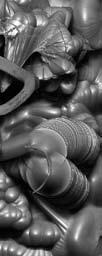
I watch intrigued, wanting to know each and every one of their stories, their names, their fears; my eyes draw angles over them, circumstance draws on, and one by one they leave their stools, still corrupted and disturbed by nothing more than time–the rhythmic clang and splash of everyday living.
from faded out chair legs and sticky table tops to scratches and carvings of lovers names, and clashing colors, muted in sweet drifts of gray; linear and flat, planes coursing in fragments of speckled light. My lenses drink in the moment behind the wooden staircase rails–gulping in the visuals of reality, of life as it rises to chaos. And I collect, like two canyon ponds, the fallen leaves the forsaken have left behind; their dust, and the sulfuric acid rain that was wrenched out by the drunken tears of their pains–lured into the emptiness of the bullet, its seductive surface, its welcoming end;
35



Memorial Day
Written by Linda Howell
All stand at attention blades of grass soldiers and family.
Dignitaries stand solemn, stern and stoic, and look to be seen.
Chopper blades whomp wind blows sand into places too small to hold and stings wide eyes.
Hit the airfield running proud, petrified paces.

A rising sun glances off rows of white crosses elegance in every line and shiny boot. Hot white flame and red wreath a snapping flag deafens against empty morning silence.
The sun falls behind a duned horizon mercury drops a degree. The dance the sweat continues. Like bees swarming in the dust faceless and unknown.
36

Words drip patriotism, Noble Heroes All.
Draped in blue suit and red tie, and bold lies.
You use them to convince. But the dead are already dead.
There will be no phone calls home today.
Two are gone.
Rows of corpses will roll over to make room for more.
Tears of loved ones
spill into silent, stark streets. For they are known to us.
Sunrise Eagle Linh Troung Digital Illustration 37
Warsong

38
Justin Watson
Bullets and Balls
Written by Clint Johnson
With 3,791 American deaths in Iraq at the moment I write this, I’ve come to the conclusion that it’s time we start taking this issue seriously. No more talk of WMD’s or propagating democracy or resisting the growing neo-colonial movement in this country. It’s time we move beyond this recreational debate and equate the war with something important: sports.
After all, ours is a nation with a heritage rich enough to encompass nation building, pioneering experimental forms of government, and all other endeavors using bullets, while remaining dedicated
to the truly important events that take place on fields and courts using balls. Our athletes are “soldiers” engaged in weekly “wars” while we, a nation of “partisan” fans, watch raptly. No matter how lopsided the score we know our team will “battle back”; we spend our days “strategizing victory plans” for the “Red Sock nation” or “Evil Empire”, or any of the other pseudo-nations dedicated to each sports team.
That’s right, the squeaky wheel gets the grease, but only if we care to keep the machine running. Squeaky junk gets junked. (That’s an argument for Iraq too,
39
Believe it or not, knowing what you intend to do when your adversary doesn’t is an advantage.
let’s chuck it so we no longer have to endure its whining.) However, if we want to approach the war in Iraq constructively we need to care about the machine enough to make it run well. What better way to make Iraq relevant than to reverse our most cherished metaphor of sport as war? Now, war is sport. Now we care So, empowered by our new perspective, how do we fix things? First, let’s try not sharing our play calls with anyone and everyone in earshot. Democrats, that’s your bad. Believe it or not, knowing what you intend to do when your adversary doesn’t is an advantage. That means
telling them is stupid. Why do you think every team in the NFL but the Patriots is livid at cute, cuddly Bill Belicheck? All he did was videotape a few defensive play calls during a game against the Jets (and every other team in the league, for all we know). Apparently, he—and the rest of the league—thought this gave his team a competitive advantage. So, in our new sport of war it probably isn’t a good idea to be broadcasting our playbook deadline by deadline on the Senate floor, in presidential stump speeches, and via any form of media willing to listen. We aren’t even forcing our opponents to be tricky
40
“You play to win the game!”
or innovative to discover our plans. We’re just telling them. Yeah, let’s stop that, okay team? Next, to borrow the immortal quote from Herman Edwards, let’s remember that “YOU PLAY TO WIN THE GAME!” That means that if you’re losing with your original gameplan you may want to make adjustments. Nope, nope, Republicans, don’t go looking around the room as if you don’t know who we’re talking about. You’re the ones that figured running that same Shock and Awe bootleg five times in a row would so confuse and demoralize the opposition that they’d run home and take
up knitting. Unfortunately, they anticipated the bootleg and every time we run it our rocketarmed quarterback—the best in the world at throwing a ball eighty yards but who runs like Grimace from the McDonald’s commercials— is left trying to juke out a 300 lb linebacker who sprints like an elk. So, now that we’re well into the game, and no matter how you look at it, not exactly blowing out the bad guys, whadaya say we call something new? I know they’d never expect us to call the same play for the twenty-sixth time but, hey, let’s be crazy.
41
Simply having an opinion doesn’t make a person qualified to express it in rational company.
Finally, let’s remember that simply having an opinion doesn’t make a person qualified to express it in rational company. Have you ever wondered why gamboling institutions give odds on the Arizona Cardinals winning the Superbowl? (They usually bounce somewhere between 60 and 150 to 1.) It’s because people actually bet money that this will happen. No, I’m not joking, real money. On the real Cardinals. To win the real Superbowl. Do you know what’s even more outrageous: these people can actually give you reasons why they’ve decided to do this. They claim it makes sense.
They think they understand the sport. The same is true of Iraq. Ron Paul is proving it as we speak by piping an ever larger mob of idiots toward his Libertarian cliff (off of which he would throw the Departments of Homeland Security, Energy, and Education just to start). Before you wager on the Cardinals to win it all because others tell you it’s a good idea, don’t you think you should expect that they explain why a matador offensive line and 58 years of failure add up to a wise bet? On the same principle you should expect anyone who expounds on the game in Iraq to know the difference between the
42
See, it’s been a game all along
Shiites and the Sunnis, that there is a history of Democracy there (despite frequent assertions otherwise), and that Iran, Syria, Turkey, Jordan, and Saudi Arabia all border the country (and, yes, that information is important). So those indiscriminately conducted polls we all hear so much about may not be as pertinent as we think; they certainly shouldn’t define the correct course for our Iraq policy. They’re kind of the political equivalent to the Hogettes (a bunch of fat guys who attend Redskins games in muumuus and rubber hog snouts)— not at all productive, but a whole lot of fun.
So, here we are: it’s us against them, all scores and strategy, and everyone except those actually in Iraq are shouting, “I know better!” See, it’s been a game all along.
43


 Spencer Anderson Photograph
First Snow
Spencer Anderson Photograph
First Snow


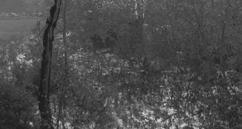

Though I hoped this heart could change You’re still my constant Still unnamed

Unrequited and Unspoken

So my silence left Unbroken
Written by Katie Christensen

Unbroken 45

 Photograph by Marck Pereira Ferrari
Photograph by Marck Pereira Ferrari
I don’t really want this anymore I speak of life without you
Laughter’s been absent for years Or at least 17 hours ago
I love you
Or who you used to be
You’re enjoying too much for me now And I’ve always been bad at decisions
We’ve been through way more than others Nothin’ but class
You were always screwing up And never on time
But I was so happy when you showed “Heroes always arrive late”
I know you care, Even though your heart screams black now
I was in when you still felt This can’t die
Stabbed in a Midnight KnifeFight
Sunshine
It’s us against them
We’re backed into a corner
And our choices are infinite
Wield these blades
Sea of red
High tide
And there’s no shallow end to retreat toward
Gold in our veins
Disassociate from the rest
Your wings are unfurling Ink seeps through Luck will shine upon us
This sand is sinking through Break the hourglass
Wield these blades
Written by Ian Humphreys
48

Shout Out
Ji-Young Park
Painting
Little Girl in Field
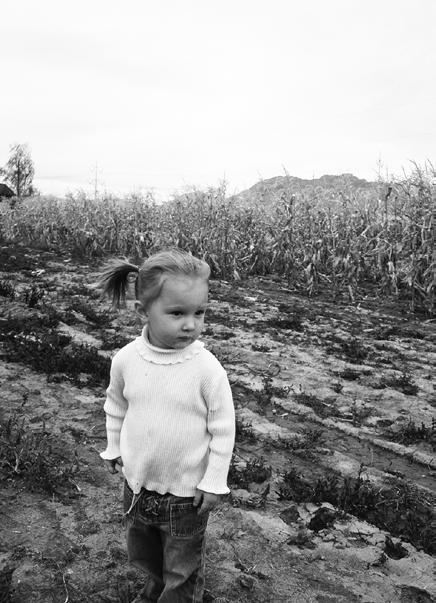 Julie Hirschi
Photograph
Julie Hirschi
Photograph
The Dream
Written by Brandyn Cross
What is the point in living it just all seems so useless
What bitter fields are these, broken, useless
Is that all there is, or does it merely seem so
The light of a new day may not be what it seems
Point me to the life, which is fair... and just
In such a place would there be no peace for all living things, and love for those... without it
51
Hippo Girl
Written by Nathan Henry Peterson
Second cousins,
he thought. He had been trying to think of what the proper term was for all the little children running around. He didn’t bother trying to think of their names. He had given up on that before even starting. He didn’t even know half of their parents (the other half being his first cousins, whom he had been around long enough to remember). He thought about how, barring some unfortunate accident, he would probably live long enough to see third cousins. Maybe even fourth. At least, assuming those were the right terms.
In trying to recall the word “second,” he had invented two new portmanteaus: cousinephew and cousiniece. He felt proud of his achievement, and knew now that he possessed adequate mental prowess to tackle that pesky world hunger issue.
“It would be so easy,” he said to no one in particular. Then he looked around to make sure no one in particular had heard him. He spotted a small, less-than-two-year-old girl over his right shoulder who was watching a small, less-than-welltrained dog beging to be let in through the back door.
52
She turned to look at him. How do kids always know you’re looking at them? He wondered. She pointed at the dog and said, “Ca.”
“Actually, it’s a dog,” he corrected her. He returned to a forward-facing position.
He had been one of the first to arrive—an unusual occurrence. He had nothing else to do, so he had left earlier than he normally would have. But, in his effort to escape boredom, he had neglected to bring a book, and thus was again left with nothing to do until everybody else showed up. They were bringing the food.
One perk of being early was the availability of larger, more permanent furniture. He was so used to being subjected to folding-chair
torture that he took advantage of a very plush-looking chair and made himself look as comfortable as possible, somewhat askew and with one leg draped over an armrest, which, as it turns out, isn’t as comfortable as it looks. It wasn’t long before his position could more accurately be called “sitting.”
So there he sat, watching an assortment of toddlers interact with each other.
he possessed adequate mental prowess to tackle that pesky world hunger issue.
53
It was actually kind of interesting, but that could have been the boredom talking. One, the oldest, picked up one of the youngest and sat her on some strange animal-shaped push-car. She didn’t seem to enjoy it, or at least didn’t much care. However, her mother came over and, through an apparently painful process, flipped the seat up and converted it into a cart that the young
This isn ’t just any hippo...
In fact, this is a HungryHung r y Hppi
girl could push herself, instead of being pushed on. This she absolutely loved to do. Looking closer, he saw that the animal was a hippopotamus, and it appeared to be submerged halfway into the floor. Except, it was propped up on rollers, so it was submerged into some kind of alternate dimension that began a half-inch from the floor. Watching, as the delighted girl pushed it around, he noticed that the head moved in a biting motion in-sync with its forward momentum. Wait a minute, he thought, this isn’t just any hippo; it’s a hungry hippo. In fact, this is a Hungry Hungry Hippo.
o
54

Later, working his way down the chow line, he couldn’t help but wonder why three-fourths of the food were various salads, no two were alike (well, maybe two alike), and when perplexing combinations mixed together took precedence over good old-fashioned oneingredient-per-dish thinking. Craisins? In the middle of all that other stuff? No thanks; I’ll take a burger. He had originally decided to eat and run, but a deliciously enticing conversation convinced him to stick around. The conversation had not even included him. It consisted of one of his cousins verbally torturing his little sister, incessantly insisting that he killed bunnies—frequently and brutally. His cousin even claimed that the burger he was eating was a particularly scrumptious bunny he had killed recently. She refused to believe a word of it; objecting but never simply walking away. It was all in good fun, of course.
rapezeClown ScreenprintbyBradon Anderson 55
So he decided to stay in the hopes of stumbling across more such gems of human interaction.
Not a man in the world had less luck than he. He ended up bouncing between a noisy living room and an ellipse of chairs in the front yard in an effort to avoid the steady stream of relatives with questions regarding aspects of his life which could easily have been filled in by anybody else in his immediate family.
There was a brief moment of enjoyment when the hippo girl (so nicknamed by him because of her fascination with the toy, and not for any physical similarities) was presented with a piece of cake. Babies are always messy, which isn’t necessarily entertaining by itself, but the fact that she managed to get cake all over her feet was somehow a ticklish sight to behold.
After being taken away and cleaned up, she was returned, along with
her favorite toy. He was again presented with the sight of hippo girl having the time of her life pushing a hippo back and forth. The trouble came when she reached the end of the patio. She couldn’t stand under her own power yet, much less turn an object around when it was as big as she, if not bigger. The two people at the extreme ends of her more-or-less-straight line of travel were goaded by the older ladies to turn it around for her, and he was one of those two people. After three turns of assisting her, he decided to get up and go someplace else. Not because he didn’t want to help, but because he found it hard to believe that happiness could come so easily as it did for hippo girl. He found his way over to the back corner of the yard, where
56
there was a markedly sudden drop. His uncle’s house was halfway up the mountainside and a good portion of the valley was nowspread out before him. Delightfully puffy clouds rolled across the sky; one partially blocked the sun which was near the end of its day’s journey.
Shafts of
ATree’s Perspective
PhotographbyDavidCrane
light broke through and fell down, whereupon they were reflected back up by the lake. One might have been deeply inspired by this sight.
Wow, he thought. This must be one expensive view.


A New
Written by Sarah Justice

A seedling breaks the damp earth
A calf on spindley legs
A newborn gives his first yawn
A hen lays its egg
An artists brush touches new canvas
A sunset
A sunrise
A new beginning
58
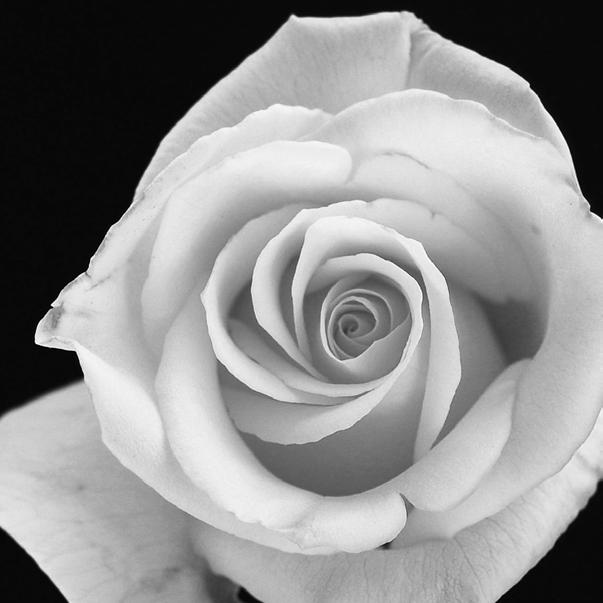
Singular
Photograph by Rachel Long
Professor Stirs Controversy by “Emulating Frost” and Flinging Students
Written by C.J. Cristopherson
Charles Arthur Price, Ph. D. and professor of Contemporary American Novelists at Princeton University, has brought a firestorm of controversy down on his school through his controversial grading methods. Harkening back to a golden age in American prose and the famous poet Robert Frost, who threw students’ term papers down the stairs and graded them on distance, Price adopted a revised version of the practice, throwing his students instead.
“Grading criteria has been a matter of instructor prerogative for over two
hundred and fifty years at Princeton,” Price insists. “Some professors stress individual analysis and controversial interpretation of thematic elements, others require intimate familiarity with multiple types of critical theory; I catapult students down the northwest stairwell and see where they land. To each his own.”
Price, a tenured professor who has taught at Princeton for nearly twenty years, began his innovative grading practice when he grew dissatisfied with his ability to fairly assess the merit of his students’ learning through
60
more traditional methods. “Writing papers and class participation have their place, but they tend to favor the gregarious ‘doer’ rather than the existentialist ‘thinker’,” Price says in defense of his abandoning mainstream grading methodology. “I’ve always believed getting students to think is my primary obligation.”
‘‘
I catapult students down the northwest stairwell and see where they land.
‘‘
“We teach people but grade papers,” Price said, “and the one thing is not a direct representation of the other. I wanted to find a way to fairly assess the totality of my students’ learning. What better way than by weight and aerodynamic composition?”
Price realized the solution to his dilemma one day when discussing the contributions of Robert Frost in class. While telling a story of how Frost graded class papers by throwing them down the stairs and seeing which traveled the shortest distance—ostensibly because they were composed of more substantive, weightier content— he realized the principle could be applied to his students.
Price claims that the old metaphor of students being like sponges is true, and that the “fuller a sponge gets, the heavier it becomes.” Acting on this logical inference, and with the help of a small counterbalance trebuchet supplied by volunteers from the school’s engineering department, he put his new grading strategy into practice for the midterm of Fall semester, 2006.
Results were immediate and dramatic, challenging the very foundation of scholastic evaluation
61
Happy World Land
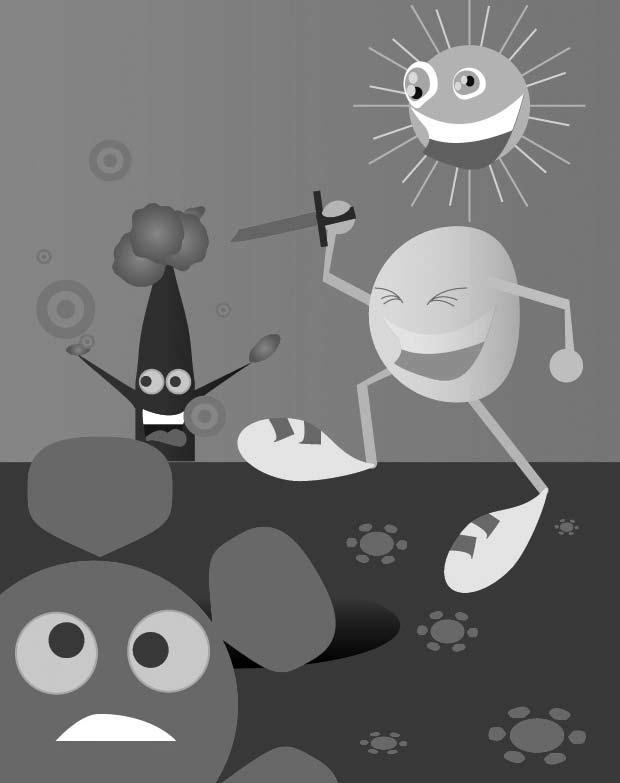
Lawrence Tyson Magana
in American higher education. Not only were the results of Price’s “student projectile trajectory assessment” distinct and unexpected when compared with more standard methods, they bordered on revolutionary. Old characteristics of “good scholarship” such as time management skills, dedication, intellect, originality, and thoroughness were shown to have far less to do with learning than originally supposed.
‘‘
‘‘ Diabetes... is a greater sign of scholastic potential...
in the history of this school,” recalls Dennis Longover, Princeton’s Dean of Academic Assessment.
“Dedicated study time, attendance, astute completion of directed assignments, everything we’d previously used in learning assessment was called in to question. We had to reassess our entire pedagogical strategy.”
“Old hallmarks of scholastic achievement revealed far less correlation with actual learning than attributes such as shoe size and favorite foods,” Price says. “Diabetes, it turns out, is a greater sign of scholastic potential than a privatized high school education.”
“The results were unlike anything
According to theories predicated upon Price’s new grading method, the propensity to read cutting-edge scholastic journals or papers and discuss controversial contemporary philosophy are, contrary to popular belief, signs of a poor college prospect. “If you want someone suited to true academic excellence, cruise the food court for the guy asking, ‘Are you going to eat that?’.”
One surprising revelation of
63
Price’s assessment revolution is that statistics confirm that male students are genuinely superior to their female counterparts. This, combined with other similar controversial factors, has been used by the growing number of Price’s critics to call for his dismissal. An organization dedicated to getting Price removed from Princeton’s faculty, named “A Price Too Great” (the APTG), was started by Amanda Igoyan, a furious parent of one of Price’s failed students, Amy Igoyan.
‘‘ ‘‘ Come on now, let’s be sensible; it’s not like I’m dropping them off the roof.
her why and she said, ‘Because I flew too far’, I just didn’t get it. I still don’t get it! What the hell is going on over there?” Price dismisses the Igoyans’ complaint of bias and unfair criteria in grading. “I remember Amy,” he recalls readily. “She was a wonderful girl who I thought was unusually bright and dedicated. Unfortunately, taking my class proved that she was really a person of very little substance.”
“I was stunned when Amy called me from the hospital crying and said she’d failed English,” Amanda said. “Flabbergasted.” Amy was a 4.0 student who had never received a grade lower than B+ on any assignment in her academic career— until Price’s class. “When I asked
And his reply to the accusation that Amy’s two broken legs — the trebuchet launched the former cheerleader clear across the stairwell and out a window — are signs of negligence?
“Come on now, let’s be sensible; it’s not like I’m dropping them off the roof.”
When complaints from families of other previously superior students who
64
struggled in Price’s classes continued, the school hired an independent study done to assess his grading practice. Price was cleared of all suspicion of wrongdoing.
“Not only is my assessment method logical and fair, but its accuracy is statistically verifiable,” Price boasts. “Results from the last year perfectly mirror the Bell Curve. What are the chances of that if the method lacked veracity?”
Despite the results of the study and the school’s declaration of support for Price and his methods, calls for his job continue to increase. For his part, Price dismisses the bulk of the criticism while admitting that his assessment method, advanced and accurate as it is, is not perfect.
“Some of the really big students bounce,” he admits. “How do I interpret that? I’m not quite sure. Without exception, these students travel very short distances before first contact, which lends me to believe they may be truly exceptional in the positive sense. However, I can’t shake the suspicion
that they don’t stay where they land because the knowledge hasn’t been permanently embraced yet. It’s a problem I still struggle with.”
Despite the challenges, both personally and publicly, Price vows to continue his pioneering assessment methods. Besides, he is quick to remind, he is seeing unexpected benefits as well.
“I never would have dared jump into a cannon if not for Professor Price’s class,” human cannonball Rufus Seville of the Barnum and Bailey Circus attests. “I owe my profession to the day he launched me down those stairs. Though, I confess, I still don’t see what that has to do with literature.”
The former pupil’s comment makes Price smile. “You see. Can you imagine the injustice of antiquated scholastic assessment for someone like Rufus, an authentic genius who somehow still manages to say, and write, and think incredibly banal things like that? If it weren’t for me and the risk I took, there’s no way he could boast that Ph. D in Shakespearean Philosophy.”
65
My Happy Thought
Written by Traci Grant
A gust of desert wind tosses a scattering of cool raindrops over my skin. Hair tangles in my face as I try to breathe in home. Home, where family is, where memories live, where life stands still.
Home is the smell of a warm summer storm, crossing the arid mountains, bringing with it the scent of wet sage, a puff of dust and the relaxing stench of the stables down the road.
Home is that one week when the alfalfa blooms and the fields are a burst of indigo, green stems and leaves reaching above your knees. That single tree on a far off hill that looks like a runaway stagecoach against the bright blue sky.
Home is the steady chichichit of the sprinklers, the flftflftflft of a distant rotary cutter, layering fresh swaths of alfalfa. Yet everything is quiet enough to hear the hum of a car on the highway a half a mile away.
Home is Grandma’s bread, pot roast, potatoes and green beans on Sunday, Grandpa’s tattered shirt, gasoline and grease and the roar of a stubborn tractor.
And yet, I have never lived in the place that is my happy thought.
66
 Pencil on illustration board by
Virag White
Klamath Woman
Pencil on illustration board by
Virag White
Klamath Woman
 Sunflower Photograph by David Crane
Sunflower Photograph by David Crane

Happy thoughts of boots almost to my thighs, tramping behind older cousins through the hayfields to change hand lines, the sky turning brilliant shades of red, pink and orange. Counting the horses in the fields during the day and, at night, the lights of the half-horse town about a mile down the highway. Fresh milk with cream that has to be skimmed off the top. Fresh cheese curds, homemade butter on homemade hot cakes.
And then life catches up. The stables are gone, the fields belong to someone else and are overgrown with thistle, just a glimmer of indigo reminds me of what they used to be. The dairy up the road has closed. And Grandma, with just herself to feed, only makes Grandma Bread, pot roast and potatoes if there are guests.
And I am a guest now, an anomaly, trying to keep everything the way it was, trying not to grow up.
I stand on the porch, buffeted by the constant wind that blows over the hills, and wait for the ache to die, for the pain to go away. Wishing for Grandpa back.
Buddy barks, dancing, eager to be running. A good distraction. I pick up his chewed up stick and fling it into the wind.
69
My Rock
Written by Cyndi Brown
I awoke with a jolt to a loud knock on my door.
“Who’s there?” I grumbled as the door was pushed open a crack, allowing bright light from the hallway to spill into the room and onto my bed.
“You have a phone call.” My RA quietly answered.
Like all Residential Advisors, she felt bad about waking me and the tone of her voice told me so.
Glancing at the clock, I realized it was nearly 2:00 a.m. Tired from a full day of school, and long meetings for my duties as Student Government President, I sarcastically thought to myself, someone better be dead. Heaving my tired body up, I slowly made my way down the dim hall, listening to my slippers scuff on the hard, linoleum floor. In my sleepy state, the glowing exit sign cast an eerie green fog down the hallway that urged me to walk faster.
Picking up the phone, I sleepily answered, “Hello?”
“Cyndi, its Aunt Karen. How are you doing?” She asked, her words sounding forced.
“Why are you calling so late? You should be in bed.” I asked, surprised at hearing her voice so late.

70
 Michael
Michael
Nikola Since 1976
“Cyn, is there a counselor or someone there that you could talk to?” She asked quickly with unmistakable concern in her voice.
I felt my stomach drop, and all the breath leave my lungs as I realized she was calling to tell me that something horrible had happened to someone I loved. Panicking inside, my thoughts immediately went to my mother, and the tightness that was forming in my chest got worse. I remembered when my mother had to have thyroid surgery a few years ago, and how scared I was, even though it’s a simple, low risk operation.
She proceeded to tell me that I had to come home as soon as possible, because my step-father, Patrick, had been found by my mother clinging to life after an overdose of Xanax and Jack Daniels. He was in ICU and barely |hanging on. I spent the night praying to a God I didn’t know to please let me get home in time to see my dad.
During the agonizing bus ride home, I thought about my dad and our relationship. My dad is a non-active alcoholic, having been sober for almost five years, a gambler, and an easily addicted person. His alcoholism and gambling made it hard for my brother, sister and I growing up, but we never went without the necessities. I thought about how tough he was on me, especially being the oldest, about things like school, boys and my weight. He always had a snide, drunken comment to make whenever he would see me munching on something after school or sometimes even during meals. Eventually, I confronted him about the things he was saying and how much they hurt me and he broke down. He cried with me and told

72

Daily Dose Joe Beckstead // Charcoal
...clinging to life after an overdose...
me he didn’t realize how much he was hurting me and he wouldn’t do it anymore. Over the next seven or so years we became closer than ever; he was my rock.
Walking down the overly bright, sterile hallway, vaguely aware of the bustle of nurses and the smell of the antiseptic hospital seeping into my head, I was not prepared for what I saw when I stepped into his room. My rock was lying there, still as death. The beeping and whirring of the life support machines hooked into every part of his body brought me face to face with the possibility of losing my dad. His face was slag, eyes closed, and his skin had taken on a frightening gray pallor that was almost corpse-like in comparison to the stark white hospital gown.
On his right cheek was a large, raw abrasion where he had been lying unconscious on the floor before he was found. IV tubes snaked from his arms, across the bed, and into a bag that was slowly dripping precious clear liquid into his veins. My mother told me that he had been completely unresponsive to any activity since arriving at the hospital and that the doctors had serious concerns of permanent brain damage.
Mixed emotions ran through me as I stood next to his bed choking back sobs. The tightness in my chest pressed harder and angry tears rolled down my cheeks. How could you want to give up like this? I thought. This is not how you want to go. Suddenly, my thoughts became selfish, thinking, how could you do this to me? Gently, I took his limp hand in mine and began talking to him about things I knew would make him smile if he could hear me: long
74
motorcycle rides down the coast, people-watching at the boardwalk, and having a coffee at his favorite spot right near the water. I hoped that my talking to him would help him realize that someone loved him and would give him strength to fight.
I’ve always called my dad by his first name, Patrick, not because I didn’t consider him my dad but because that’s just the way it was. Standing there, hot tears streaming from my eyes, still holding his hand in mine, I whispered softly,
“Daddy, I’m here now, and it’s gonna be all right, but I need you so you have to get better”.
Suddenly, his clammy, lifeless hand tightened around mine and squeezed so hard I jumped a little. I looked at his face, but he still had not moved. I knew he had heard me and, at that moment, I was filled with love, determination, pride, and admiration for this man who had tried to selfishly remove himself from my life. Maybe not even understanding the words, but just hearing my voice was the encouragement he needed to stay strong.
My dad recovered at a miraculous pace; suffering only minor injuries from a fall he had taken before unconsciousness. No brain damage was evident. My rock had returned in full force. I never asked him if he had truly heard me that day, but I’m positive he did. I know now the power of love and have learned that just as he was always there for me, I needed to be there for him. I came through when he needed me most, as he had always done for me. I realized that my stepfather had earned the name ”Daddy” a long time ago.
...he had been lying unconscious on the floor...
75
El amante fantasme
El amante fantasma (The Phantom Lover)
The Phantom Lover Kayla (K.C.) Cunningham
Written by Kayla (K.C.) Cunningham
Language, I have found, isn’t everything; as the words that were never spoken lie on the surface of my untamed conscious, unaware of the unfathomable that larks beneath me, the hidden, undetected currents that patiently await to drown me, and drag me beneath it’s unstill tide; as I thrust and scream in temptation, grasping for a much needed breath–until I realize that I am in so deep, that there is no escape, and the only thing left for me to do is die.
I don’t remember how this happened. How it came to this–how one morning I fell, unnoticed; like a wounded bird in hunting season; how I loved you, like the flower that doesn’t bloom, because I did not know any other way to love–except in the very form in which I stood in front of you, hoping that my lack of beauty would not phase you.
76
But somehow it always did; and as I stood naked in your presence I became the unwanted, like dust between shadow and space–like a humiliated waiter, or the smell of an empty house. Slipped into drunk, infinitely dense nights that crept into the white washed walls of my bedroom; into the indigo pool, now mixing with the acidic composition of the blood and murder of words–words born in the gory outcome of emotions–grown in the dark body, beating, rhythmically, and released like Pandora’s box from dead fathers and wandering lunatics, from lands that have returned to stone because pain had marked its settlers and took them to the unpaved roads, to wander, lost, and without hope. The blood of the widows, Indians, Jews, the Hebrew slaves, and star crossed lovers; my blood.
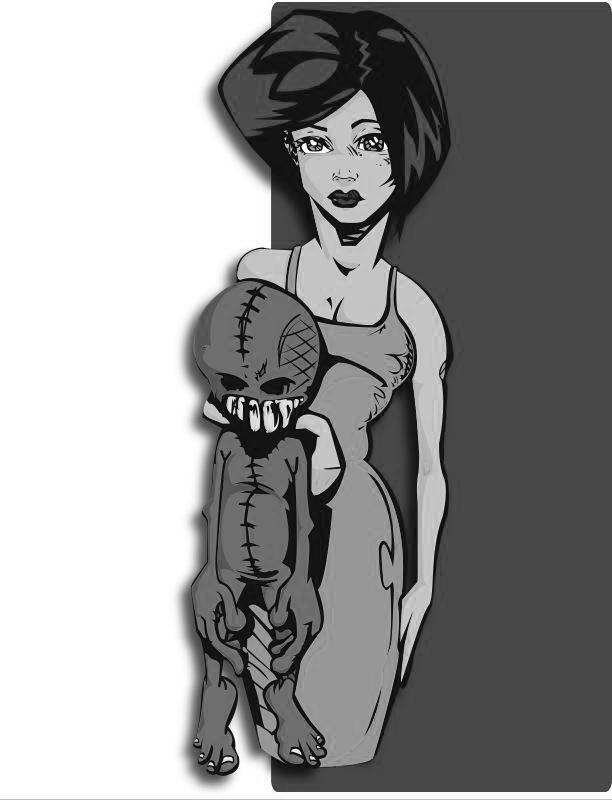 Teddy Jonathan D.
Teddy Jonathan D.
77
Lisonbee
sinking into thigs fate for a long time.
bleeding into the barbaric night
I feel the waters close around my rib cage like quicksand; I have been sinkin into this fate for a long time Everyone has seen it coming, except for me. I guess I was just always too busy and too blind to see it imminence
Trapping me, into this cold oblivion of loneliness.
the only hope of life Obstinate, I refused
The light slowly dims above, behind, proximal–bleeding into the barbaric night as I drowned away from the surface of words, down to where there is nothing to explain, where no tongue moves except yours, and the stench of utter disgust is coming out, leaking bitter poison from your mouth. Trapping me; into this cold oblivion of loneliness I could have told you, as you stood above me–that I loved you; but I could not let you see the tears of weakness I shed over you. Obstinate, I refused the only hope of life I had left because I did not want you to know the power you had over me.
78
I was drowning, In my complete love for you would never love me much as you loved her
surrendering myself undergrounf stem of eternity and declares you, my eternal bride Until death takes you
That inside my obese carcass, I was drowning, in my complete love for you–screaming for help because the feeling of hopelessness had washed over, and that I struggled knowing that deep down you would never love me, as much as you loved her; so I let go, as you walked away from my sight. I accepted death, in the deep, liquid darkness, willingly sacrificing my body and rejected love to the underground stream of eternity; surrendering myself to the lost idea of your mind, and my mind as one. Instead I would be carried away slowly, inexorably on a stretcher, to a place where all is silent, beautiful, where words said, mean less than words spoken–a place where I could haunt you, unreservedly, and without restraint, until death takes you, and declares you, my eternal bride.
79
The Zebra War
Written by S.A. James
In Carthage, Africa there lived a tribe of horses that was known as the Zebra tribe. They were one of the many horse tribes of Poseidon, the god of the sea. The leaders of the tribe consisted of two brothers by the names of Brock and Zeboni. The tribe was made up of black horses and white horses. After the brothers began bickering over what color was superior the whole tribe broke out into civil war. With Zeboni as the leader of the white horses, and Brock the leader of the black horses. The war went on for over ten years.
Staff Contribution
On the sixth lunar cycle, during the tenth year of the war, Zeboni woke to find his spy return after four lunar cycles of searching for Brock’s camp. The news that was brought to Zeboni put a dark smirk on his mouth. The spy found out that Brock had finally settled camp about five days east of Zeboni’s camp. The best part of the news was that the place where Brock finally decided to settle was in a narrow passage in the mountains, this gave Zeboni the chance to surround his brother and finally finish the war once and for all. Immediately Zeboni readied his troops for their final battle and for six days thereafter they marched to the canyons.
80
It was dawn on the nineteenth day of the fourth lunar cycle. Brock walked around the camp looking around at the tribe. The children were trotting around, playing games with each other. The Mothers were peacefully grazing in the fields enjoying each other’s company. The men were taking shifts for guard duty, or gathering around chatting about the latest news on the world. Brock watched his people living peacefully as if they had finally dodged the war. Brock knew the war wasn’t over, and was angry about it. Why was his brother so keen on feeling more superior since he is white?
Why couldn’t they live in peace together like the days before the war? Why did Zeboni hate colored horses? These questions flew through Brocks head over and over. Brock just wanted the war to end as soon as possible. Little did he know, his brother stood a near fifty meters above Brocks camp planning to do just that for his brother.
Around noon, Zeboni saw that it was time for a shift change in guards, meaning that for less than three minutes Brock’s guard would be down. This was his final chance to finish the war.
81
At that moment a battle cry flew through the air as Zeboni’s troops, fully armored and ready, charged into Brock’s camp killing all in their path. Women and children ran in fear as the white monsters charged on, killing any black horse that got in their way. Brock had very little time to regroup and fight back. Even worse, he was surrounded.
Five days went by as the horses fought, while Poseidon merely watched. Tired, hungry, and wounded, Zeboni and Brock finally met each other on the battlefield for their final battle. They charged, rammed, and kicked each other until one finally fell. Brock looked up from the ground that his blood now soaked. Zeboni stood over him, one foot on top, saying, “So Brock, now you see that the white horses are the superior ones chosen by Poseidon himself. Today, you will die like all of your colored friends.” Brock sputtered, “please brother, stop this pointless violence.” “You’re no brother of mine,” Zeboni stated as he reared back for the kill.
At the very moment that Zeboni reared back the heavens boomed, “STOP!” Zeboni stumbled and fell. They all looked up into the heavens to see the majestic figure that was their god, Poseidon. “Stop, all of you. I’m tired of watching my children fight amongst each other.
82
Why do you believe that because of the color of your skin you’re more superior than the other?”
Zeboni began to speak when Poseidon roared, “NO ZEBONI, I refuse to listen to your selfish excuses. All of you are my children, which means you’re all brothers to one another. Treat each other as such.”
Poseidon waved his trident above the battlefield magically changing each horse on the field from black or white horses to black and white striped horses. “You all are brothers of the Zebra tribe, go out and live as such.” Poseidon made one last look before he disappeared back to his throne.
Within the next several lunar cycles, the horses of the Zebra tribe slowly made peace with each other, realizing that the color of skin doesn’t mean that they’re different than someone else, they are all brothers of the same race. Years later the tribe expanded throughout Africa becoming the Zebras that we know of today.
The End
83
 Water Tower in City
Photograph by Julie Hirschi Staff Contribution
Water Tower in City
Photograph by Julie Hirschi Staff Contribution

Sea Shore Blues
Written by Andrew Call
The black serpent king sits atop his throne shaking his fist, pretending to know the unknown he slips into his mask and purple studded boots now he’s Jesus and we’ve all been fooled
but we just stare and wait to be taught about how faith, humility and love can all be bought and it seems so real, so we take it all to heart but we don’t want to die, so we make our children take part
and we begin to wonder, why children return numb holding a cocked-back fist and a stick of chewing gum ready to make sense and break the bony smile but it will never work, fixing just seems to take awhile
while the mistreated underdog sits across town hatching a plan, a scheme to bring us all down he’ll use negligence and the city’s crooked key and he’ll laugh and smile, watching us all bleed
so my subtle friend a lost blind refugee uses concrete to wash his mouth and feet so he won’t make another foolish decision but he always will, it’s just how he was risen
and I can’t seem to remember, how life is meant to go so I asked a deaf fortune teller, but my future was too far below I guess I’ll just fiddle, with the hazards as they fall and count my exploits, atop the sunken velvet wall
85
bios &AUTHOR ARTIST
Lynn Kilpatrick
Folio Advisor
Lynn Kilpatrick is an instructor at SLCC and adviser to Folio. She earned an MA in Poetry from Western Washington University and a PhD in Fiction from the University of Utah. She mostly writes fiction, but she sometimes writes poetry and other times she writes nonfiction. When she’s not writing she’s thinking about writing, if she’s not watching TV or thinking about watching TV. She knows more about Pokemon and superheroes than is necessary. She is at work on a novel. But not right at this minute.
Adam Haver
Folio Literary Editor
Adam Haver is not sure if he is a freshman, sophomore or what. He loves writing, the arts, and the outdoors. He was recently married and is planning on having around twenty kids. His wife thinks he’s crazy. His dream-jobs include but are not limited to: working in a graphic design and/or literature setting, designing strategy games, and novel writing.
Jenna Neilson
Folio Design Editor
Jenna has one semester left until she has her Associates Degree in Visual Arts and Design with an emphasis in Graphic Design. She loves music and writes original pieces on the piano. She loves to spend hours on end at the piano, just making up songs (if time allows.) Jenna also enjoys movies and has helped her friends create quite a few short films for various film competitions.
Neal C. Whitlock
Folio Staff Member
Neal has been interested in writing since grade school. Most of his writing is centered in fantasy fiction, but he has also written philosophy and ethics papers. He is currently attending SLCC and plans to transfer to BYU to study computer animation.
S. A. James
Folio Staff Member
Scott is in his first semester of college. As an English major he plans on becoming an author of fantasy and science-fiction.
86
Bradon Anderson
Bradon is definitely one of a kind. He is a wonderful photographer as well as designer. He doesn’t see other students and designers as competition, but as a support and resource to share ideas with. Braden has a great sense of humor and is constantly making those around him laugh and feel at ease. He definitely has a talent for making people smile.
Clint Johnson
Clint is a freelance writer and tutor in the SLCC Writing Center. A published author of fiction, non-fiction, academic writing, criticism, and technical writing, he is a board member for the Oquirrh chapter of the League of Utah Writers. His first children’s novel, The Green Dragon Codex, is contracted for publication by Mirrorstone Press, with an anticipated release date of June 2009.
Linh Troung
Linh is the CIO and Senior Software Developer of LTSOFT.NET. He is a scientist and artist born and raised in Vietnam. He is in love with computer graphics, especially vector and three-dimensional.
Lawrence Tyson Magana
Lawrence is currently in the Visual Art and Design program to get his associates degree in Multimedia and Animation. He is studying different styles at SLCC so he can experience a new way of looking at art. He will always feel there is never an end to his progression as an artist, because as he progresses he continues to study new ways of reaching people through art. Even though his purpose of being an artist is to make people feel, only some of his pictures have a very deep meaning, most of them are just for laughs and were just meant to enjoy.
C.J. Cristopherson
C. J. Christopherson is pretty sure he's an idealogical construct rather than a normal person. He suspects this is why he prefers to write fictional lies rather than the factual ones society currently favors. Recently his nephew has been seeing monsters beneath the bed, so much of his time has been spent hiding in the closet with a baseball bat, convinced the intruder is actually Dick Cheney.
87
Brandyn Cross
Brandyn is a Christian songwriter, recording artist, and writer, currently majoring in film production. On the personal side of things, he is married with seven children. The Dream is an expression of hope amid despair. Yet, in a ‘poem within the poem,’ literally surrounding that hope, we find the ultimate embodiment of hopelessness, threatening to envelope and crush any such promise of relief.
David Crane
David is 18 years old and graduated from Taylorsville last year. He is a senior year and took a photography class solely to get his final art credit required for graduation. However, during this class he fell hopelessly in love with photography. Now he can't get enough of it. He just bought a brand new Nikon D40 and is trying to save up enough to buy an underwater casing so he can take it scuba diving.
Jonathan D. Lisonbee
He earned his associates degree at Dixie State in St. George and has been an SLCC Student for about a year now. He has been a working artist and graphic designer for the past 5 years and is also attending school at the Art Institute, Salt Lake City. His hobbies include screaming and drawing on his face.
Spencer Anderson
Spencer is 23, married and has one child. He is going to SLCC to be an Architect, and is a sophomore. He loves photography and the images that come from your creative mind. He feels that a picture really depicts the feeling of the heart, if the photographer knows how to show that.
Linda Howell
Linda, as a SLCC freshman, has recently added writer and scholar to her full life as mother, wife, business professional, and doggie-owner. She has been touched, provoked, softened and enhanced by the works of many artists, and the love of her family and friends. Sometimes family encompasses world events and particularly in this piece links to the national and global tensions surrounding war. All aspects of life can contain beauty, but it is through writing, recently, that Linda chooses to see a difficult-to-understand world beautifully.
Michael Siguenza
Michael is 47 years old and was raised in Seattle, Washington. He worked as a commercial fisherman, inter-coastal tug boater and restaurateur. He is an English Major working on a novel and has a 12 year old daughter who lives in Idaho who has been published as well.
88
Andrew Call
Growing up Andrew was always scared of writing, and now finds himself even more fearful of its ability to expose human truth. He hopes his writing reveals some unknown place inside the reader, but would be fine if it were just being used as a coaster in a coffee shop. A lot of people drink coffee.
Ian Humphreys
Ian Humphreys is an underweight vegetarian who enjoys cartoons and Nintendo way more than any 19 year-old should. This is his first time having any kind of a literary piece published and his first real attempt at poetry. He loves to let his imagination run wild and draws inspiration from his best friend, Kyle, for whom this poem is about; his girlfriend, Amy, and the ocean. Ian is attending SLCC to complete his generals before pursuing a degree in nutrition and health science; knowing the nutritional breakdown of every edible substance, this only seems fit.
Ji-Young Park
Ji-Young was born in Seoul, South Korea in April 26, 1986 and immigrated to South Pasadena, California at 2001. He moved to Utah in 2003 and spends most of his time drawing.
Cyndi Brown
“My Rock” was inspired by her step-father, Patrick. Going through this experience with him made her realize that people are capable of change and that love really is all you need, it can save lives. She loves to write, it’s the only way to clear her mind and heart. She’s an aspiring journalist and photographer originally from Southern Delaware with plans to earn her BA in Journalism at the University of Delware. Dont ask her what she is doing so far from home, the only true answer is living and loving it.
Ryan Hollist
Ryan would like to thank Jason Pickavance, Gary Howard, and Lynnette Yerbury for their support and encouragement of his writing. He would also like to give a special thanks to Lynn Kilpatrick for her initial encouragement to submit his work. After four poems, one e ssay, and one short-story through four editions |of Folio he is moving on from SLCC – and onward with the love of writing.
Sarah Justice
Sarah is 43 years old and the mother of three grown children. She is a full-time student in Visual Arts. She has been writing and drawing since she was just a kid and after graduating hopes to have a career doing what she enjoys most.
89
Justin Watson
Justin Watson is overworked and banging his head up against some mad fool’s wall with his thoughts and fingers aimed at a screenplay, a novel, and a plethora of visual artistic pieces. He loves pen & ink because of the textures it produces. A majority of his inspiration is derived from dreams, literature, and an incredible need to push the envelope. He currently resides on the edge of the table where the envelope is pushed.
Jonathan Bentley
Jonathan is currently studying Arabic at SLCC. He works full time as a bread baker, and enjoys writing poetry, short stories, and songs.
Katie Christensen
Katie has not always been interested in writing, it was not until she began a detailed study of rhetoric that she began to fully appreciate its power as a means of education and subsequently, personal liberation. Katie enjoys the challenge of creating an approachable work for an audience that do not share her view and opinions in order to inspire discussion and re-thinking of issues.
Joe Beckstead
Joe is working on his Art degree and hopes to graduate within the next decade or two; the class of 2027? He’d like to give a shout out to all the obese artists out there.
90
EDITOR thanks
As editors
we would like to thank those who have supported us and really made this possible. Lynn our sarcastic and well-versed advisor, the writer center tutors for allowing us to share “office space”, the Folio staff and their dedication to creativity, Michael Amis the VP of Public Relations for his expertise, and Ryan Christensen for contributing his web skills.
The
biggest
thanks
should go to the writers and artist who have contributed to this work, without them there would clearly be no Folio. We hope that those who enjoy, or at least tolerate, the works within realize the diversity and talent we have at our own College.
Last of thanks
to SLCC who has fulfilled the request of John Cleese who said, “If you want creative workers, give them enough time to play.”
-Adam Haver & Jenna Neilson
91
College Credit Gain Experience Build Portfolio staff
Students are able to gain credit in an English Special Studies course (ENGL 1900-Student Publications) while working on Salt Lake Community College’s literary magazine, Folio.
Folio is looking for staff members to assist with the creation of folio for Spring 2008. This is a great experience to assist with the process of creating a publication from beginning to end.
Being a Folio staff member is a great addition to your porfolio and resume!
Interested students should email Lynn Kilpatrick at: Lynn.Kilpatrick@slcc.edu
92
JOIN
Artists- Submit scanned images or computer graphics at 300 DPI in CMYK. We accept the file formats tiff, pdf, and jpg. Submit via email as an attachment under 10mb.
Submit entries to:
folio@slcc.edu
Please remember to include your:
Full name, phone number, e-mail address, and title of work. Entries will NOT be accepted without this information
Writers- You may submit work that is up to 3000 words max. Submit your work in microsoft word formats doc, rtf, and txt. Now
For additional information visit us at www.globestudentmedia.com/folio
Accepting
Entries Due: February 26, 2008
93
Spring’08 ENTRIES FOR
2005 2004
Aseditorswe’dliketothankthosewhohavesupported writercentertutorsforallowingustoshare“officespace”, Relationsforhisexpertise,andRyanChristensenfor havecontributedtothiswork,withoutthemthere withinrealizethediversityandtalentwehaveat said,“Ifyouwantcreativeworkers,givethem madethispossible. Lynnoursarcasticand staffandtheirdedicationtocreativity,Michael webskills.Thebiggestthanksshouldgo Folio.Wehopethatthosewhoenjoy,or ofthankstoSLCCwhohasfulfilled Aseditorswe’dliketothankthose writercentertutorsforallowingus Relationsforhisexpertise,and havecontributedtothiswork, withinrealizethediversityand said,“Ifyouwantcreative madethispossible. Lynn staffandtheirdedication webskills.Thebiggest Folio.Wehopethat ofthankstoSLCC Aseditorswe’d writercenterRelationsforhavecontributed within said,made
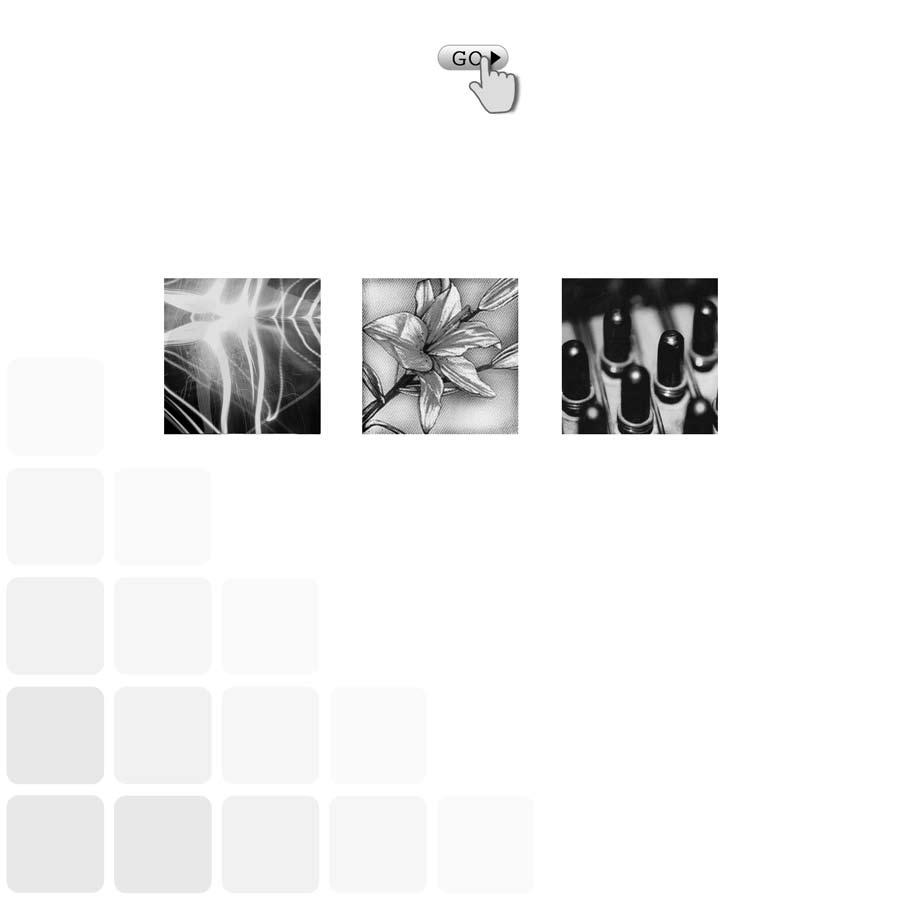
94 online FOLIO AVAILAbLE ONLINE AT
About Press
FAQs
News Pickup Archives
Support
WWW.SLCC.EDU/FOLIO
Submit
Contact
2006
forcontributing therewouldclearlybenoatourownCollege.Lastof


VPofPublicRelationsforhisexpertise, artistwhohavecontributedtothiswork, workswithinrealizethediversity said,“Ifyouwantcreative possible.Lynn dedicationbiggest
themenoughtimetoplay.”Aseditors andwell-versedadvisor,thewritercenter MichaelAmistheVPofPublicRelationsforhis gotothewritersandartistwhohavecontributedtothis enjoy,oratleasttolerate,theworkswithinrealizethediversityand fulfilledtherequestofJohnCleesewhosaid,“Ifyouwantcreativeworkers, thosewhohavesupportedusandreallymadethispossible.Lynnoursarcastic allowingustoshare“officespace”,theFoliostaffandtheirdedicationtocreativity,Michael work,andRyanChristensenforcontributinghiswebskills.Thebiggestthanksshouldgotothe withoutthemtherewouldclearlybenoFolio.Wehopethatthosewhoenjoy,oratleasttolerate, diversityandtalentwehaveatourownCollege.LastofthankstoSLCCwhohasfulfilledtherequestofJohn creativeworkers,givethemenoughtimetoplay.”Aseditorswe’dliketothankthosewhohavesupportedusand Lynnoursarcasticandwell-versedadvisor,thewritercentertutorsforallowingustoshare“officespace”,theFolio dedicationtocreativity,MichaelAmistheVPofPublicRelationsforhisexpertise,andRyanChristensenforcontributinghis biggestthanksshouldgotothewritersandartistwhohavecontributedtothiswork,withoutthemtherewouldclearlybe thatthosewhoenjoy,oratleasttolerate,theworkswithinrealizethediversityandtalentwehaveatourownCollege. SLCCwhohasfulfilledtherequestofJohnCleesewhosaid,“Ifyouwantcreativeworkers,givethemenoughtimeto we’dliketothankthosewhohavesupportedusandreallymadethispossible.Lynnoursarcasticandwell-versedadvisor, centertutorsforallowingustoshare“officespace”,theFoliostaffandtheirdedicationtocreativity,MichaelAmistheVP Relationsforhisexpertise,andRyanChristensenforcontributinghiswebskills.Thebiggestthanksshouldgotothewritersand contributedtothiswork,withoutthemtherewouldclearlybenoFolio.Wehopethatthosewhoenjoy,oratleasttolerate, withinrealizethediversityandtalentwehaveatourownCollege.LastofthankstoSLCCwhohasfulfilledtherequestofJohn said,“Ifyouwantcreativeworkers,givethemenoughtimetoplay.”Aseditorswe’dliketothankthosewhohavesupported madethispossible.
Lynnoursarcasticandwell-versedadvisor,thewritercentertutorsforallowingustoshare“office andtheirdedicationtocreativity,MichaelAmistheVPofPublicRelationsforhisexpertise,andRyanChristensen skills.Thebiggestthanksshouldgotothewritersandartistwhohavecontributedtothiswork,withoutthemthere hopethatthosewhoenjoy,oratleasttolerate,theworkswithinrealizethediversityandtalentwehave SLCCwhohasfulfilledtherequestofJohnCleesewhosaid,“Ifyouwantcreativeworkers,give thankthosewhohavesupportedusandreallymadethispossible.Lynnoursarcastic allowingustoshare“officespace”,theFoliostaffandtheirdedicationtocreativity, RyanChristensenforcontributinghiswebskills.Thebiggestthanksshould withoutthemtherewouldclearlybenoFolio.Wehopethatthosewhoenjoy, haveatourownCollege.LastofthankstoSLCCwhohasfulfilled enoughtimetoplay.”Aseditorswe’dliketothankthose well-versedadvisor,thewritercentertutorsforallowing

supported
space”,
95

SLCC Literary Journal




 Written by Lynn Kilpatrick Folio Advisor
Written by Lynn Kilpatrick Folio Advisor

 Lawrence Tyson Magana
Lawrence Tyson Magana
 Hope Michael Nikola
Hope Michael Nikola







 Jonathan
Jonathan









 Spencer Anderson Photograph
First Snow
Spencer Anderson Photograph
First Snow








 Photograph by Marck Pereira Ferrari
Photograph by Marck Pereira Ferrari

 Julie Hirschi
Photograph
Julie Hirschi
Photograph






 Pencil on illustration board by
Virag White
Klamath Woman
Pencil on illustration board by
Virag White
Klamath Woman
 Sunflower Photograph by David Crane
Sunflower Photograph by David Crane


 Michael
Michael


 Teddy Jonathan D.
Teddy Jonathan D.
 Water Tower in City
Photograph by Julie Hirschi Staff Contribution
Water Tower in City
Photograph by Julie Hirschi Staff Contribution






